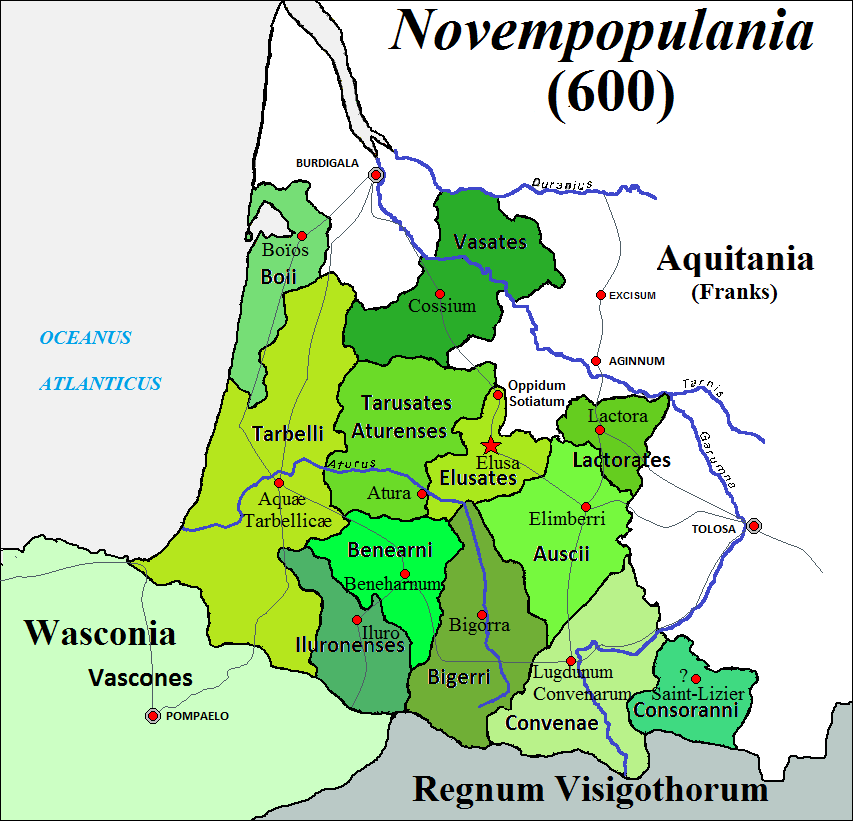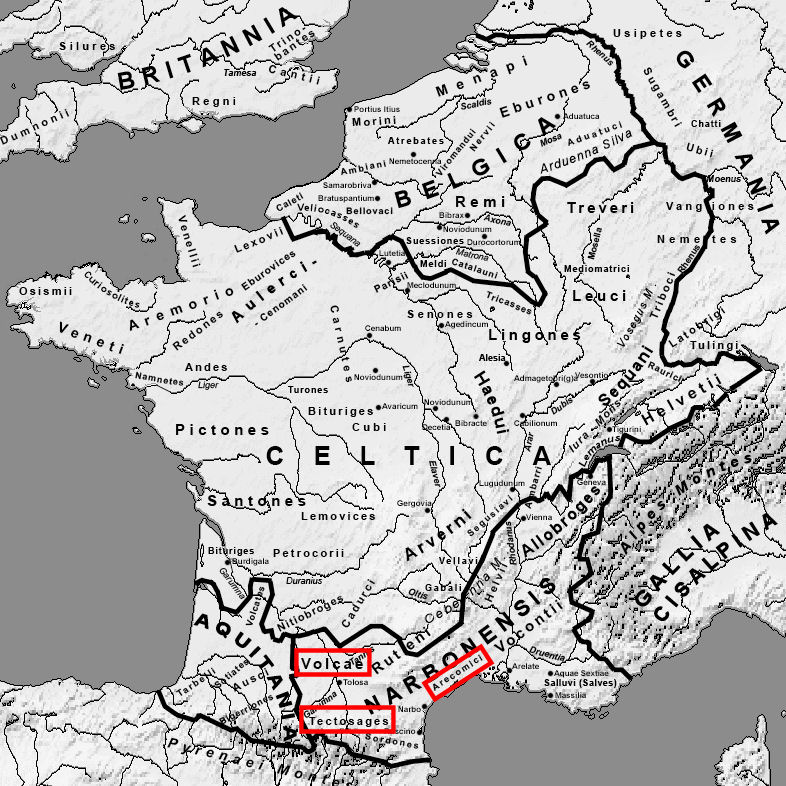|
Begerri
The Bigerriones or Begerri were an Aquitani tribe dwelling in present-day Bigorre during the Iron Age. They were subjugated in 56 BC by the Roman forces of Caesar's legatus P. Licinius Crassus. Name They are mentioned as ''Bigerriones'' by Caesar (mid-1st c. BC), and as ''Begerri'' (var. ''Begerbi'', ''Bebergi'', ''Bergebi'') by Pliny (1st c. AD). The Bigorre region, attested as ''Begorra'' ca. 400 AD, is named after the tribe. Geography The Bigerriones lived in the Bigorre region, in the northern foreland of the Pyrenees. Their territory was located north of the Onobrisates, south of the Atures, Elusates and Auscii, east of the Venarni, and west of the Volcae Tectosages. Their chief town was known as Bigorra Castrum (modern Saint-Lézer). Culture It is believed the Bigerriones spoke a form or dialect of the Aquitanian language, a precursor of the Basque language.Jacques Lemoine, ''Toponymie du Pays Basque Français et des Pays de l'Adour'', Picard 1977, See a ... [...More Info...] [...Related Items...] OR: [Wikipedia] [Google] [Baidu] |
Aquitani Tribes Map-fr
The Aquitani were a tribe that lived in the region between the Pyrenees, the Atlantic Ocean, and the Garonne, in present-day southwestern France in the 1st century BC. The Romans dubbed this region ''Gallia Aquitania''. Classical authors such as Julius Caesar and Strabo clearly distinguish the Aquitani from the other peoples of Gaul, and note their similarity to others in the Iberian Peninsula. Their old language, the Aquitanian language, was a precursor of the Basque language and the substrate for the Gascon language (one of the Romance languages) spoken in Gascony. Between the 1st century and the 13th century, the Aquitani gradually adopted the Gascon language while part of the Roman Empire, then the Duchy of Gascony and the Duchy of Aquitaine. History At the time of the Roman conquest, Julius Caesar, who defeated them in his campaign in Gaul, describes them as making up a distinct part of Gaul: Despite apparent cultural and linguistic connections to ( Vascones), the reg ... [...More Info...] [...Related Items...] OR: [Wikipedia] [Google] [Baidu] |
Aquitani
The Aquitani were a tribe that lived in the region between the Pyrenees, the Atlantic Ocean, and the Garonne, in present-day southwestern France in the 1st century BC. The Romans dubbed this region '' Gallia Aquitania''. Classical authors such as Julius Caesar and Strabo clearly distinguish the Aquitani from the other peoples of Gaul, and note their similarity to others in the Iberian Peninsula. Their old language, the Aquitanian language, was a precursor of the Basque language and the substrate for the Gascon language (one of the Romance languages) spoken in Gascony. Between the 1st century and the 13th century, the Aquitani gradually adopted the Gascon language while part of the Roman Empire, then the Duchy of Gascony and the Duchy of Aquitaine. History At the time of the Roman conquest, Julius Caesar, who defeated them in his campaign in Gaul, describes them as making up a distinct part of Gaul: Despite apparent cultural and linguistic connections to ( Vascones), ... [...More Info...] [...Related Items...] OR: [Wikipedia] [Google] [Baidu] |
Basque Language
Basque ( ; ) is a language spoken by Basques and other residents of the Basque Country (greater region), Basque Country, a region that straddles the westernmost Pyrenees in adjacent parts of northern Spain and southwestern France. Basque is classified as a language isolate (unrelated to any other known languages), the only one in Europe. The Basques are indigenous to and primarily inhabit the Basque Country. The Basque language is spoken by 806,000 Basques in all territories. Of them, 93.7% (756,000) are in the Spanish area of the Basque Country and the remaining 6.3% (50,000) are in the French portion. Native speakers live in a contiguous area that includes parts of four Spanish provinces and the French Basque Country, three "ancient provinces" in France. Gipuzkoa, most of Biscay, a few municipalities on the northern border of Álava and the northern area of Navarre formed the core of the remaining Basque-speaking area before measures were introduced in the 1980s to stre ... [...More Info...] [...Related Items...] OR: [Wikipedia] [Google] [Baidu] |
Aquitanian Language
The Aquitanian language was the language of the ancient Aquitani, a people living in Roman times between the Pyrenees, the Garonne river and the Atlantic Ocean. Epigraphic evidence for this language has also been found south of the Pyrenees, in Navarre and Castile. There is no surviving text written in Aquitanian. The only evidence comes from onomastic data (roughly 200 personal names and about 60 deity names) that have survived indirectly in Latin inscriptions from the Roman imperial period, primarily between the 1st and 3rd centuries AD, with a few possibly dating to the 4th or 5th centuries. The Gascon language has a substrate from Aquitanian, with certain words related to Basque. Relationship to Basque The consensus among scholars is that Aquitanian was a Paleo-European language genetically related to Basque, though there is debate over the exact nature of their relationship. Some linguists, like R. L. Trask, argue that it was a near-direct ancestor of Basque, whi ... [...More Info...] [...Related Items...] OR: [Wikipedia] [Google] [Baidu] |
Saint-Lézer
Saint-Lézer (; ) is a commune in the Hautes-Pyrénées department in south-western France. See also *Communes of the Hautes-Pyrénées department A commune is an alternative term for an intentional community. Commune or comună or comune or other derivations may also refer to: Administrative-territorial entities * Commune (administrative division), a municipality or township ** Communes o ... References Communes of Hautes-Pyrénées {{Tarbes-geo-stub ... [...More Info...] [...Related Items...] OR: [Wikipedia] [Google] [Baidu] |
Volcae Tectosages
The Volcae () were a Gallic tribal confederation constituted before the raid of combined Gauls that invaded Macedonia c. 270 BC and fought the assembled Greeks at the Battle of Thermopylae in 279 BC. Tribes known by the name Volcae were found simultaneously in southern Gaul, Moravia, the Ebro valley of the Iberian Peninsula, and Galatia in Anatolia. The Volcae appear to have been part of the late La Tène material culture, and a Celtic identity has been attributed to the Volcae, based on mentions in Greek and Latin sources as well as onomastic evidence. Driven by highly mobile groups operating outside the tribal system and comprising diverse elements, the Volcae were one of the new ethnic entities formed during the Celtic military expansion at the beginning of the 3rd century BC. Collecting in the famous excursion into the Balkans, ostensibly, from the Greek point of view, to raid Delphi, a branch of the Volcae split from the main group on the way into the Balkans and joined two ... [...More Info...] [...Related Items...] OR: [Wikipedia] [Google] [Baidu] |
Auscii
The Auscii or Ausci were an Aquitani tribe dwelling around present-day Auch during the Iron Age. Alongside the Tarbelli, they were one of the most powerful peoples of Aquitania. Name They are mentioned as ''Ausci'' by Caesar (mid-1st c. BC), Pliny (1st c. AD) and Pomponius Mela (mid-1st c. AD), and as ''Au̓skíois'' (Αὐσκίοις) by Strabo (early 1st c. AD)., s.v. ''Auscii''. The ethnonym ''Auscii'' may be related to the prefix ''eusk''-, meaning 'Basque' in the Basque language (''euskara''). The city of Auch, attested as ''civitas Auscius'' in the early 4th century AD, is named after the tribe. Geography Their territory was located north of the Onobrisates, west of the Cambolectri and Volcae Tectosages, south of the Lactorates, west of the Atures. The chief town of the Auscii was known as Elimberrum (modern Auch), whose name can be compared to the Basque ''ili-berri'' ('new town'). Culture It is believed that the Auscii spoke a form or dialect of the Aquit ... [...More Info...] [...Related Items...] OR: [Wikipedia] [Google] [Baidu] |
Elusates
The Elusates were an Aquitani tribe dwelling in the modern Gers department, around present-day Eauze, France during the Iron Age and the Roman period. They were subjugated in 56 BC by the Roman forces of Caesar's legatus P. Licinius Crassus. Name They are mentioned as ''Elusates'' by Caesar (mid-1st c. BC) and Pliny (1st c. AD), and as Elusa on the ''Tabula Peutingeriana'' (5th c. AD)., s.v. ''Elusates'' and ''Elusa''. The etymology of the ethnonym ''Elusates'' remains uncertain, but the root ''elus(a)''- is generally presumed to be of Aquitanian origin. Alternatively, a connection with the Celtic root *''elu(o)''- ('numerous') has also been proposed. The city of Eauze, attested in the 4th century AD as ''civitas Elusa'', is named after the tribe. Geography The Elusates dwelled south of the Sotiates, north of the Onobrisates, east of the Tarusates, west of the Lactorates, and northwest of the Ausci., Map 25: Hispania Tarraconensis. The pre-Roman oppidum of Esbé ... [...More Info...] [...Related Items...] OR: [Wikipedia] [Google] [Baidu] |
Pyrenees
The Pyrenees are a mountain range straddling the border of France and Spain. They extend nearly from their union with the Cantabrian Mountains to Cap de Creus on the Mediterranean coast, reaching a maximum elevation of at the peak of Aneto. For the most part, the main crest forms a divide between Spain and France, with the microstate of Andorra sandwiched in between. Historically, the Crown of Aragon and the Kingdom of Navarre extended on both sides of the mountain range. Etymology In Greek mythology, Pyrene is a princess who gave her name to the Pyrenees. The Greek historian Herodotus says Pyrene is the name of a town in Celtic Europe. According to Silius Italicus, she was the virgin daughter of Bebryx, a king in Mediterranean Gaul by whom the hero Hercules was given hospitality during his quest to steal the cattle of Geryon during his famous Labours. Hercules, characteristically drunk and lustful, violates the sacred code of hospitality and rapes his host's ... [...More Info...] [...Related Items...] OR: [Wikipedia] [Google] [Baidu] |




